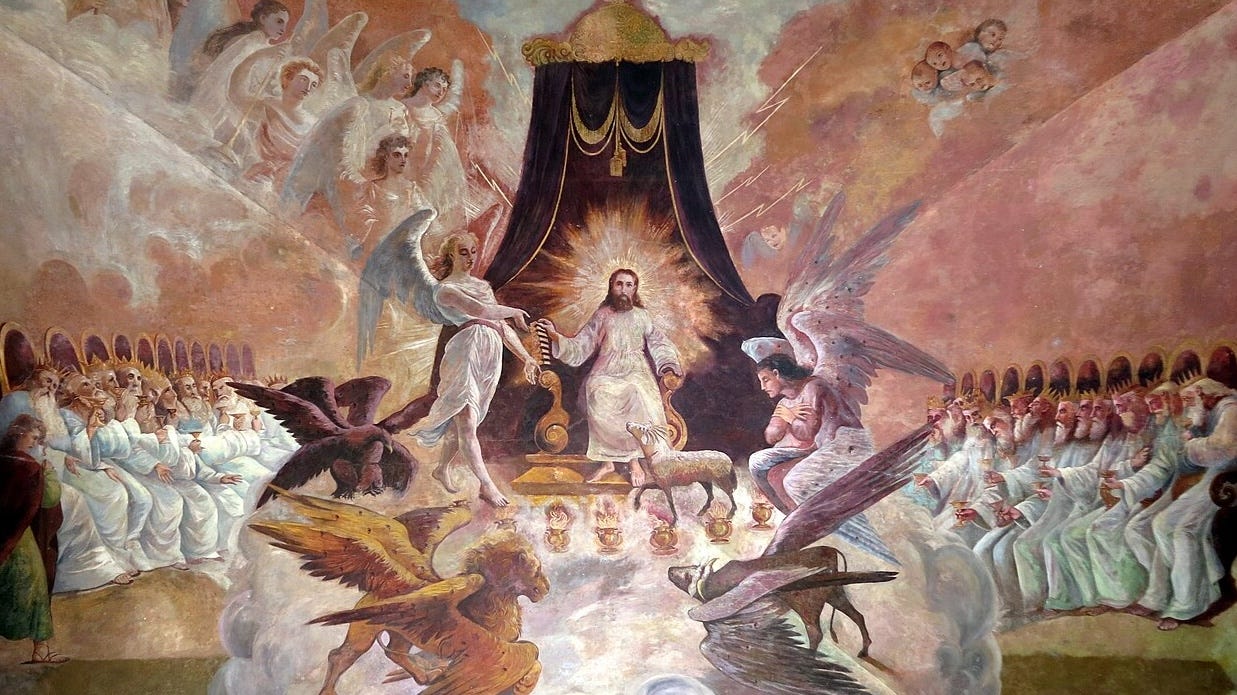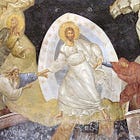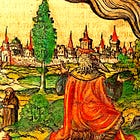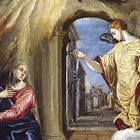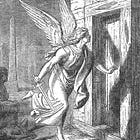"What is the New Covenant?" The Prophet Jeremiah and Cornelius à Lapide explain
Some Jewish authorities say there can be no New Covenant or New Testament, because the Old was already perfect. What did Jeremiah actually prophesy?
Exclusive Translation of Cornelius à Lapide SJ on Jeremias and the New Covenant
On the feast of Pentecost, we celebrate the coming of the Holy Ghost upon the Apostles and Our Lady, and the promulgation of the new covenant and the law of Christ into the world.
This is particularly fitting, because Israel’s feast of Pentecost also celebrated the giving of the Mosaic Law at Mount Sinai.
But what is this “new covenant”?
Holy Scripture teaches directly that God promised a new and eternal covenant through the prophet Jeremias. This promise has been strikingly and evidently fulfilled in the Christian revelation and the Roman Catholic Church.
First, some objections.
Obj. 1. Some object that there was no need for a new covenant, because that given at Sinai was already perfect, and already eternal. They claim that Jeremias’ prophecy was merely a figure of speech, meant to express a renewal of the old covenant.
Against this, we respond with the plain meaning of the word “new” and the evident meaning of the text:
“I will make a new covenant with the house of Israel, and with the house of Juda: Not according to the covenant which I made with their fathers, in the day that I took them by the hand to bring them out of the land of Egypt […] But this shall be the covenant that I will make with the house of Israel.” (Emphases added)
Obj. 2. They also say that if the new covenant promised is that which has been brought by Christ, then the old covenant “was somehow annulled.”
Against this, we respond that it has been fulfilled – but also point out that Jeremias himself speaks of:
“… the covenant which they made void.”
Obj. 3. It is also alleged that Christ changed or distorted the Torah, and that there will not be a new covenant that replaces or modifies the Torah.
Once again, we respond that Christ could be said to have “replaced” or “modified” the Torah in the sense that he has fulfilled and superseded it, and brought it to a higher and more perfect level – as indeed the fourth-century Midrash Rabbah says the Messiah will do:
"A new Torah will emit from Me" (Midrash Rabbah, Leviticus based on Isaias 51:4).
And:
"The Torah which we study in this world is naught in comparison to the Torah of Moshiach [Messiah]." (Midrash Rabbah, Ecclesiastes 11:8).
Obj. 4. Finally, they may say that this covenant was to be made with Israel and Judah, not the whole world.
Against this, we respond that Christ did first come “to the lost sheep of the House of Israel” (Matt. 10.6) – and it was the House of Israel that (by and large, but not wholly) rejected him.
But further, as St John tells us, he came “not only for the nation, but to gather together in one the children of God that were dispersed.” (John 11.52). This new covenant, offered first to them and rejected, nonetheless remains available to the “House of Israel” today – and many of this House continue to avail themselves of it.
At a later date, we could also look at the many prophecies which speak of God bringing the world to himself, and not just a single nation.
So much for these objections. Once one understands that Christ and his holy Catholic Church really do fulfil this promise and the whole of the Old Testament, let’s thank God, and remember this at Pentecost, the commemoration of both the old and new Laws being promulgated.
Let’s also remember it each time we are at Mass, when priest is consecrating the chalice of the blood of the new and eternal covenant.
And let’s pray indeed that those who think themselves still to be under the old covenant are brought into the one embrace of our Redeemer and Lord, Jesus Christ – so that we may together “sit down with Abraham, and Isaac and Jacob in the kingdom of heaven.” (Matt. 8.11) – and so “there shall be one fold and one shepherd.” (John 10.16)
Without further ado, let’s see how the great biblical commentator Fr Cornelius à Lapide SJ explains this passage from Jeremias, including the one or two parts which might seem obscure at first.
Commentaria in Sacram Scripturam
Tomus VI – Complectens commentaria in quatuor Prophetas Maiores.
Cornelius à Lapide
Translated by The WM Review with the help of AI. Pages 635-7.
Commentary on Jeremias Chapter 31.31-34
“Behold the days shall come, saith the Lord, and I will make a new covenant with the house of Israel, and with the house of Juda: Not according to the covenant which I made with their fathers…” (Jer. 31.31-2)
“New Covenant” – this passage refutes the Jews, who claim that the old law and Judaism should not be abrogated but should endure forever. For, as the Apostle says in Hebrews 8, by saying "new," Jeremiah has made the old obsolete.
Thus according to Galatinus, the ancient Rabbis teach that the law will be renewed through the Messiah – that is, a new one will be introduced, namely the Gospel; and that the Messiah will bring about a spiritual circumcision of the heart and mind in place of the physical and Mosaic circumcision, as Jeremiah states here.
… In the day that I took them by the hand to bring them out of the land of Egypt… (Jer. 31.32)
That is, I led Israel, not as a servant, but as a child, leading them by the hand like a father. I brought them out of Egypt, and on the fiftieth day after this deliverance, namely on Pentecost, I gave them the law and made a covenant so that the Jews, mindful of such great liberation, would observe it faithfully.
… The covenant which they made void, and I had dominion over them, saith the Lord. (Jer. 31.32)
That is, the Jews broke my covenant, although I offered and promised to be their Lord; and, as it is in Hebrew, their spouse and husband: for the Hebrews call this בַּעַל, "baal": whence Vatablus translates: "And I performed the duty of a true spouse towards them."
It can be secondly translated and explained with St. Jerome, Rabanus, St. Thomas, and Lyranus thus: "And I, as their Lord, punished and neglected them," as the Septuagint has it, which St. Paul follows in Hebrews 8:9.
Maldonatus states that this is the first difference between the new and the old covenant: the old one has been nullified and abolished, while the new one will never be abolished. The second difference is that in the old covenant, God was a ruler, that is, he acted with severity: "For the law brings wrath," Romans 4:15. But in the new, he will act kindly towards the faithful in the spirit of love because he will be placated by the death of his Son. The third difference follows.
But this shall be the covenant that I will make with the house of Israel, after those days, saith the Lord. (Jer. 31.33)
Note I: This is just as when God made an old covenant with the Hebrews at Sinai in Exodus 19 and 24, by which he obligated himself to be their God and protector and to give them the land of Canaan under this condition: if the people obeyed him and kept his laws. This covenant was confirmed in Exodus 24 with the blood of victims and a common meal of the covenant parties.
For Moses and Aaron, acting as representatives of God, ate with the people from the sacrificial victim: Moses was here like a herald and mediator between God and the people.
Similarly, God made a new covenant with Christians, of which Christ is the herald and mediator. By this covenant, God, through the whole Gospel, obligates himself to give Christians his grace, the forgiveness of sins, friendship, adoption as children, all help and support for doing good and living well, and finally the inheritance of eternal life, under this condition: if they obey him, if they accept and observe the faith and law of Christ, which is brief and easy, namely the faith and Sacraments. Hence it is called new because it brings new promises, precepts, Sacraments, new grace, new life, a new man.
Note II: Christ instituted and confirmed this new covenant, first and foremost with his blood, making himself a victim on the cross; secondly, with the Eucharistic meal, which he communicates to all until the end of the world. Therefore, Christ instituted this covenant not only in the long sermon on the mountain, as Theodoret would like to argue, but throughout his life and the entire Gospel: wherein the covenanting parties are God, the Apostles and other Christians; and the herald is Christ.
Note III: Just as the old covenant was promulgated on Mount Sinai at Pentecost, so the new one was promulgated on Zion at Pentecost: and just as the law of Moses was given on stone tablets as a condition of the covenant, so in the new covenant, the law of Christ is given on the tablets of the heart. The former was written with a pen, the latter by the Spirit of the living God: for through Christ, grace and charity have been poured into our hearts, that is, into our free will, by prevenient, accompanying, and sanctifying grace.
Therefore, free will is not abolished here, as Calvin wishes, but is entirely presupposed in the free voice; and because, as I said, this covenant, like any other, requires a condition on our part – namely, that we freely obey God calling, and cooperate with his grace, pursue justice, and persevere in it if we wish to attain the heavenly inheritance.
Just as Moses descended from Sinai to the people, carrying the tablets of the law; so the Apostles, carrying the Holy Spirit and his doctrines and gifts in their minds, descended from Zion to all nations, and proposed and communicated these to them.
Note IV: The old law was written on stone tablets, the new one on hearts. If heretics observed this, they would understand that tradition is more proper to the new testament than Scripture, and they would stop delineating faith and religion with ink. This indeed is characteristic of men ignorant of the very nature of the Gospel, in which they so greatly glory; for the Gospel does not consist in letters and syllables, as Maldon rightly observes.
I will give my law in their bowels, and I will write it in their heart: and I will be their God, and they shall be my people. (Jer. 31.33)
Note: The thing God promised us in his new covenant and testament is the Holy Ghost, or the law of grace and charity, inspired and inscribed in the mind. Hence St. Augustine in "On the Spirit and the Letter," chapter 21, says, "What are other laws written by God in hearts, if not the very presence of the Holy Ghost?"
On the contrary, in the old covenant, the law written on tablets was not that which was promised, but rather the condition of the covenant. Here, however, note that God does not inscribe the Holy Ghost in the heart and mind alone, as he wrote the old law on stone tablets alone; but he requires the consent and cooperation of free will, and this is the condition of the covenant both new and old.
Therefore, God now inscribes his law and counsels, not in books or tablets or fringes as formerly among the Jews, but in the very mind and intellect of Christians, when he impresses faith and prudence in actions upon them, and frequent illuminations and insights by which he shows the mind how beautiful the law of Christ is, how useful, divine, and sweet, how shameful sin is, how easy repentance is, how pleasant a pious and Christian life is.
Secondly, he inscribes these on memory, when he impresses and refreshes the memory of these things in a person.
Thirdly, he inscribes these on the heart and will; when he instills in them pious affections towards the law of God, satisfactions, impulses, promptitude, and finally charity, so that the will says: "Lord, give what you command, and command what you will." Thus St. Augustine in "On the Spirit and the Letter," chapter 17 and following.
And they shall teach no more every man his neighbour, and every man his brother, saying: Know the Lord: for all shall know me from the least of them even to the greatest, saith the Lord: for I will forgive their iniquity, and I will remember their sin no more. (Jer. 31.34)
This is not as if the private spirit of each person should be the judge of controversies of faith and the rule of actions: for this cannot be seen and known by others: and everyone would say they have this spirit, and thus in the Church there would be the utmost confusion and dissension, as we see among the Lutherans and Calvinists, indeed even among the Calvinists themselves in Holland and elsewhere we experience this more and more daily.
Therefore, this spirit is not of God, but of the devil; as it divides and tears apart the one Church, making out of one Church a thousand, contrary and inconsistent with each other.
Therefore:
Firstly, St. Augustine in "On the Spirit and the Letter," chapter 24, explains it thus: In heaven no one will teach another; because all will see all things in God. But the Prophet speaks of the grace of the new testament, which is given to the faithful in this life, not in heaven.
Second, St. Ambrose in his commentary on Hebrews chapter 8 thinks Jeremiah speaks of the Apostles: for they were taught not by man, but by Christ and God. But even this is too narrow an interpretation.
Third, St. Jerome explains it thus: A man will not teach his neighbour that there is one God and idols should not be worshipped; for everyone will know this in the new law; whereas in the old law, Gentiles, and even Jews often worshipped idols.
Fourth, St. Thomas explains it thus: In the new law, they will not seek out Jewish or philosophical teachers, nor philosophical arguments to come to the knowledge of God; but they will approach Holy Scripture, the Apostles, and similar divine teachers and preachers.
Fifth, St. Chrysostom, Theophylact, Oecumenius, in their commentaries on Hebrews chapter 8, and St. Augustine in "On the Grace of Christ," chapter 12, explain it thus: There will be such ease and grace in the law of the Gospel that great labour will not be necessary to learn what is necessary for salvation; so that even children, as we see, immediately grasp it: for the precepts will be few, and there will be a great illumination from God the teacher.
And this is what Jeremiah mostly means to say – that there will be such great illustration of the Holy Spirit in the new law, and such an evident impulse to believe, hope, and love that the external preaching of faith will seem little and almost nothing compared to that internal voice of the Holy Ghost; for external preaching is indeed also required: for God has placed pastors and teachers in the Church for this purpose (Ephesians 4:11. This is similar to 1 John 2:27, where St. Augustine can also be consulted.)
Note: "They will know," that is, they will properly know, and knowing will honour, fear, and love. This is a metalepsis. [“In a metalepsis, a word is substituted metonymically for a word in a previous trope, so that a metalepsis can be called, maddeningly but accurately, a metonymy of a metonymy.”[1]]
Hence St. Jerome rightly says here, "The knowledge of one God is the possession of all virtues." Again Aeschylus: "He who knows what is fruitful, not what is much, is wise." And Lactantius in "Divine Institutes," book 2: "The common people sometimes know more: because they know as much as is necessary." And Seneca in epistle 89: "To want to know more than enough is a kind of intemperance."
Note here four goods that God promises in the new covenant. He promises:
First, that he will give and inscribe his law in our hearts
Second, that he will be our God, and we will be his people
Third, that all will know the Lord
Fourth, that he will be merciful to our sins.
Thus saith the Lord, who giveth the sun for the light of the day, the order of the moon and of the stars, for the light of the night: who stirreth up the sea, and the waves thereof roar, the Lord of hosts is his name. (Jer. 31.35)
That is, God who ordered the moon and the stars, so that they move and rise according to a certain order and law to illuminate the night: this God, I say, promises what follows.
“If these ordinances shall fail” – namely, those of nature, for example, the fixed paths of the sun, the moon, and the agitation of the sea, its waves and tides. This means, “If I keep the constant order in natural things, much more in supernatural things; and sooner these would perish than the seed of Israel – that is the faithful people, and the Christian Church – would fail.”
“Who stirreth up the sea” – He who makes the sea roar, so that it is tumultuous with waves. In Hebrew it is, 'who divides' or 'splits the sea;' for the sea seems to be split by the waves. Otherwise, Vatablus says, who 'divided the Red Sea', so that under the leadership of Moses, the Hebrews crossed, and the Egyptians were drowned (Exodus 14).
Thus saith the Lord: If the heavens above can be measured, and the foundations of the earth searched out beneath, I also will cast away all the seed of Israel, for all that they have done, saith the Lord. (Jer. 31.38)
That is to say:
“Just as no human can comprehend the height and magnitude of the heavens, or penetrate the depth of the earth, so it will never happen that I reject the whole of Israel because of their iniquities, which they have committed; rather, for the sake of Christ, the Apostles, and some others from Israel – and at the end of the world – I will restore all Israelites to myself and to him, for salvation and the Church."
End.
HELP KEEP THE WM REVIEW ONLINE!
As we expand The WM Review we would like to keep providing free articles for everyone. If you have benefitted from our content please do consider supporting us financially.
A subscription from you helps ensure that we can keep writing and sharing free material for all.
Plus, you will get access to our exclusive members-only material!
Thank you!
Further Reading:
Translated from the Latin available at Google Books.
[1] Harold Bloom, A Map of Misreading, Oxford University Press, Oxford, 1975.



